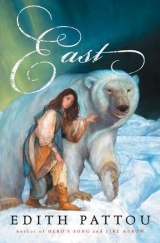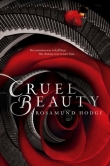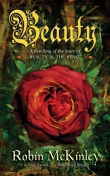
Текст книги "East "
Автор книги: Эдит Патту
сообщить о нарушении
Текущая страница: 24 (всего у книги 24 страниц)
White Bear
I STOOD IN FRONT OF the mountain for a long time. Surely, the castle inside was gone or, if not, was inaccessible to someone with no arts. The sheer rock face showed no sign of an entrance, but then it never had. I thought back to the many times I had gone in and out of that mountain. All I had had to do then was just picture the door opening and it did. Perhaps if I tried that now...
There was a grinding sound and to my amazement the rock face opened, revealing the interior of the castle. I rubbed my eyes, unbelieving. It was very dark inside, but the sun of the afternoon shed some faint light into the front hallway.
I entered.
There were no lamps burning, and therefore it was pitch-black. I kindled a flame in a lamp in the front hall with a striker I had with me. Carrying the lamp I began to explore the castle. It was very cool—the fires had not been lit for a long time—and there was an uncanny stillness about the place. I periodically lit lamps along the way, leaving a trail of light behind me.
Entering the music room, I gazed around at the familiar and well-loved instruments. That had been one of the worst parts of being imprisoned in a white bear's body; with no fingers or lips, I had been unable to play music.
I crossed to the flauto, the one I had preferred over all others, and picked it up. It had always been so familiar to me. I wondered if the Troll Queen had taken it from my previous life, or just re-created it for me. But why? Had she wanted to make me feel at home, or to torture me?
I put the instrument to my lips.
Rose
VAETTUR MADE GOOD TIME. I did not think I could be very far behind the white bear—that is, if I was right about his destination.
I must have caused quite a few people to stare as I rode Vaettur through the countryside of Fransk. I could tell that the reindeer was not comfortable in the warmer climate, but the early spring weather was still cool enough that he was not miserable.
The forest "hanté" was even denser than I remembered, and the empty farm just as eerie, but soon we had arrived at the base of the mountain. I found the open door right away and knew then that I had guessed correctly. I peered in the entrance, surprised to see that the castle was still there and that the white bear had managed to enter.
Vaettur followed me into the cool entrance hall but stayed there to munch on some oats I had brought for him in a small bag.
I followed the trail of lamps through the dim, echoing hallways, feeling surrounded by ghosts, whispering, sighing in my ears. I thought of Tuki; the pain of his loss was still a fresh wound. Seeing the place where we had first met and played our silly language game was like a blade twisting into me.
The lamps led me to the music room, but when I looked inside, it was empty. Then I heard it—the sound of a flauto. The music was far away, and I turned to follow it. As I made my way back through the hallways, listening closely, I recognized the song as the one he had been playing back in the ice palace when I had hurried toward the banquet hall. And the one I had long ago tried so pathetically to play. "Estivale."
As I moved closer I realized the music was coming from the room with the red couch. I approached the doorway, almost afraid to enter.
But I did.
And there he was, sitting on the red couch, playing his flauto. There was a large book of music open on the couch beside him.
He saw me and stopped playing. Our eyes met and he stood.
I crossed the room to him. "I love you," I said in a rush, afraid I would change my mind.
"Charles," he replied.
I stared at him.
"My name," he said with a smile that lit his face. Setting down his flauto, he leaned over and picked up the book beside him on the couch. Opening it to one of the blank pages at the beginning, he pointed to some words written in a flowing, cursive hand:
Charles Pierre Philippe, Dauphin
"I wrote this," he said. "My name. I am Charles Pierre Philippe." He set down the book.
And then he took both my hands tightly in his.
Father
MY DAUGHTER NYAMH ...my daughter Rose married Charles in a small ceremony in the front parlor of our house in Trondheim. Her sister Sara's wedding to Harald Soren had taken place several weeks before and was a much grander affair. But Rose and Charles both insisted on a simple celebration, and the joy in Rose's face shone no less than Sara's; in fact, it was that much brighter for being so hard won.
When Charles slipped the silver ring on Rose's thumb, I thought he had gotten confused—or that it was a custom peculiar to Fransk—but Rose seemed well pleased with her thumb-ring, and anyway, my attentions were diverted by the tears streaming down Eugenia's face. She had forgotten her handkerchief—or rather, I learned later, she had deliberately not carried one because of some superstition that if the mother of the bride brings a handkerchief to her daughter's wedding, a horrible tragedy will occur within the first year of the marriage. Or some such nonsense. So I had to lend her mine.
Neddy
CHARLES PIERRE PHILIPPE was the fifth child of Charles VI, king of Fransk. My friend Havamal, the custodian of Master Eckstrom's library of books, helped me track down information about Charles's origins. It turned out that Valois, the word inscribed on the ring he gave Rose when they married, was the title of the line of royalty from which he was descended. Charles's younger brother was the dauphin whom the maid Jeanne d'Arc helped to put on the throne. But that is another tale.
All it says in the written history was that Charles, beloved son of Charles VI and Isabeau, was born around the time of a peace parley of Amiens and died at age nine. From what we have learned of his parents—his father was hopelessly mad and his mother greedy and traitorous—it is possible he was better off as a white bear. I do not know whether he would agree with that or not.
At any rate, Rose and Charles built a small home for themselves in Fransk, not very far from that castle in the mountain. In fact, they took several wagonfuls of furnishings and other assorted items—mostly musical instruments and weaving paraphernalia, as far as I could make out—from the castle, and then they closed the entrance behind them for good. The spot on which they chose to build their house was close by Rose's friend Sofi and her young daughter, Estelle. At first we were all disappointed that they did not make their home in Njord, but the port of La Rochelle was not too distant, and we managed to visit back and forth at least once a year.
Charles dedicated himself to music and, in fact, invented a new design for flautos in which the mouthpiece cap contained a sponge to absorb the moisture from the player's breath. It was quite a success, and Charles became both a sought-after musician and an inventor. However, he never cared much for traveling, preferring to stay at home with his wife and children. They had four—one for each of the cardinal points of the compass, Mother said, although Rose vehemently denied it. They named their firstborn Tuki.
Rose could not give up her wandering ways entirely, though she was blissfully happy at home with her "white bear"—as she still sometimes called him. She occasionally got Charles to go on journeys with her, but her second-born child, Nena, was a north-born, so we all knew it wouldn't be long before Rose was kept busy running after her. Which seemed only right.
And Mother never gave up her superstitious ways. She liked to point out that the skjebne-soke had been right all along about north-born Rose being buried in a deluge of ice and snow. The fact that Rose did not perish, Mother claims, was a minor detail, and probably due to the mitigating factor of being in proximity to a talking white bear. Or some such nonsense, as Father would say.
Neither Rose nor Charles liked to talk much of their adventures with the trolls, but some of the so-called "softskins" whom they had brought out of Niflheim, as well as the crew of the ship Soren had hired to go north to find Rose, must have spread the story, because for many years afterward, there were tales told of a race of trolls living at the top of the world.
Only Rose and her white bear know the whole truth of it.
Glossary
Anglia—England
Arktisk—the Arctic
Danemark—Denmark
Finnland—Finland
Fransk—France (also French)
Gronland—Greenland
Huldre—the troll kingdom (also its people)
Inuit—a people who live in the far north of Greenland and Canada
isbjorn —ice bear
Iseland—Iceland
leidarstein —lodestone
Niflheim—frozen land of the dead
Njord—Norway Njordsjoen—North Sea
Saami—a people who live in the far north of Norway
skjebne-soke —fortune-teller
Tyskland—Germany
Acknowledgments
This book has been a journey of many years, and I, like Rose, had a great deal of help along the way from many people who were generous with their support and wisdom. Above all I would like to thank the "Havamals"—librarians who patiently and wisely led me through the byways of researching Norway, compasses, the Arctic, and white bears.
Many thanks also to Jean Emery and David Wilhelm, who led me to the fjords and were patient and forgiving when lost manuscripts needed to be retrieved (twice!); Sarah McPhee and Lennart Ericsson, who showed me the archipelago; Robin Cruise, who ferreted out all those spinning heads and "of courses," making my writing spotless; and my editor, Michael Stearns, who is Thor, Malmo, Sofi, and Neddy all wrapped into one—and who makes me laugh.
I also want to thank Vita, whose wanderlust and strength of character rival that of Rose, and the real Charles, who has been my north, south, east, and west from the beginning.
Chatting with Edith Pattou
How long have you leen writing?
I've been writing since I was a child. The first story I wrote, at age seven or eight, was called The Adventures of Lipid Shortsock and followed the exploits of a swashbuckling squirrel. At age eleven, inspired by the book Harriet the Spy, my best friend and I started spy notebooks, and I believe I've kept a notebook/journal ever since.
What is your writing process? Do you work at certain hours or on certain days, or under any special conditions?
I write my initial drafts longhand and then edit them on the computer. I don't stick to a strict schedule the way some authors do, but when I'm in the midst of writing a book, I write every day, usually in the morning. I've gone through periods when I find it difficult to concentrate at home (because of things like laundry and phone calls), so I write in restaurants. I have a few favorites, including a pub-style restaurant down the street and a pizza place in a nearby shopping mall. I wrote much of East in the cafe of a local bookstore.
Are your characters inspired by people you know?
It's unusual for one of my characters to be entirely based on a particular person, but there are bits of people I know in all of my characters. For example, Neddy was somewhat inspired by my husband and the strong love he had for his younger sister, as well as the sense of responsibility he always felt for her (although, as far as I know, he's never dabbled in writing bad poetry).
How do you come up with story ideas?
I don't seem to have trouble coming up with ideas. They come into my head all the time (hence the need to carry a notebook!) and they come from everywhere—newspaper stories, dreams, songs, watching a play, sitting in a car on a long drive. Which isn't to say that all these ideas are brilliant—far from it. There's a lot of sifting that needs to be done.
Rose's family is quite large. Did you grow up in a big family?
No. In fact, I am an only child. But when I was young I used to love reading a series of books about a very large, cheerful family called the Happy Hollisters, and I was always envious of friends from big families. When I got married, I was fortunate enough to marry into a large, wonderful family.
One unique feature of East is the use of poetry as the voice of certain characters. What inspired you to do that? Do you write a lot of poetry?
When it came time to give the white bear a voice—and I decided early on that one of the voices telling the story must be his—I initially made it stream-of-consciousness, just a flow of words with lots of dots between them. But each time I read over the words, they seemed wrong. I thought about what it would be like for a human voice buried inside an animal brain to try to find its way out. I decided the words would be very condensed and charged and sensory, which is how I think of poetry. So I decided to make each one of his chapters a poem.
But I don't write a lot of poetry. I won a school prize for a poem I wrote back in elementary school, and it's been downhill ever since (kind of like Neddy, who abandons his early efforts at poetry!). I did enjoy giving it a go in East, so perhaps one day I might rekindle that early spark.
Thus far three of your novels have been fantasies. What about the genre attracts you?
Ever since I discovered C. S. Lewis's Narnia books, I've been a lover of fantasy. As a child, I loved the way it took me away to a completely different world. When I got older, I became intrigued with the idea of actually constructing such a world. The first two fantasies I wrote were set in Eirren, a land based on Celtic mythology. But for East, although it is based on a fairy tale, I purposefully set the story in a very specific, very real time and place—Norway in the sixteenth century.
Along Rose's journey, she goes through a progression of different guides. Can you elaborate on this element of the story?
In the original fairy tale of "East of the Sun and West of the Moon," the heroine of the story gets to the far distant land of the trolls by riding on the backs of the East, West, South, and North Winds, an image I loved as a child. But as much as I hated giving up that image, I decided that in my tale I would turn those winds into people who would represent the four different points of the compass. So Sofi and Estelle are south and east, respectively; Thor is west; and Malmo is north, of course. Each one guides Rose along a portion of her journey, lending his or her own specific skills and support.
The compass motif is prevalent throughout East, seemingly as a metaphor that one's life can go in many directions. But Rose's mother had the directions of her children's lives planned out from the day they were horn. Did her expectations for her children shape their lives, or were their lives predestined by the points on a compass?
That's an interesting question. Rose would seem to be an example of predestination, since she is much more guided by her birth direction than her mother's influence. But I guess I'd have to say that there is a little of both at work. I've always been fascinated by the question of fate and how the choices we make from day to day might drastically affect the direction of our lives.
In East, Rose goes on a literal, physical journey as well as an internal, personal one. How do you think her adventure changes her inwardly?
In the prologue Rose says about herself that over the course of her journey she learned "a little bit about patience," and that is certainly one of the main changes she undergoes. She also gains insight into her impulses, learning both how to curb them as well as how to use them to find her way toward her goal. She grows up and settles down, having learned how to love.
The Origins of East
By Edith Pattou
The novel East is based on the Norwegian fairy tale "East of the Sun and West of the Moon." I first read the story as a child, in one of the Andrew Lang fairy books. I loved the heroine, a spunky unnamed girl who was brave enough to ride on the back of a great white bear and then ride the East, West, South, and North Winds. I admired her unyielding spirit, her tenacity, and the sureness of her love for the enchanted prince she was so determined to save. But I came to write East in a rather roundabout way.
I had been working for several months on a book that was to be a humorous, satiric fantasy about two kids who come across a portal that leads them into the landscapes of all the different fairy tales. I had the story mapped out but came grinding to a halt, suffering from an advanced case of writer's block. There was one part of the story that I kept returning to in my thoughts, the part when the two children enter the land of "East of the Sun and West of the Moon." And suddenly it struck me that that was the story I really wanted to tell.
When I started to write East, I had recently finished the book The Poisonwood Bible by Barbara Kingsolver. I loved her use of various voices to tell the story, and I decided that would be an intriguing way to tell the tale of East. (It turned out to be quite a challenge, trying to keep each voice distinct, and in the editing process, even more of a challenge to keep them all straight. I wound up having to storyboard the book on a large table in my basement to keep track of all the different threads of the story.)
I did a great deal of research in the course of writing East. I had to become an expert of sorts in many disparate areas, such as: weaving, compasses, mapmaking and its history, seamanship, Scandinavian languages, Norway in the sixteenth century, the Inuit people, Norse mythology, everything to do with the Arctic, and of course, polar bears. Our local zoo doesn't have any polar bears, so I traveled to Chicago to observe one. As I stood watching and taking notes about the large male polar bear, a family came up to the railing beside me and I heard one of the children say, "Oh, he looks so lonely!" Which summed up my white bear perfectly: lonely and waiting.
I also had the opportunity to travel in Norway while I was writing East, and I journeyed by ship through the fjords. It was summer rather than winter, but it gave me a sense of the grandeur and immense quiet of the fjords. I visited a summer farm near Andalsnes, which provided a model for Rose's family farm. The trolls one finds in souvenir shops in Norway, as well as in traditional Scandinavian folklore, were nothing like the ones I created for my story. But in researching Norwegian folktales, I came across stories about a race of trolls called the Huldre, who were beautiful and clever rather than ugly and stupid, though they did have tails that they kept hidden under clothing.
The ending of East came together almost magically, like the final pieces of a difficult jigsaw puzzle. I had constructed the plot to take place in the 1500s, had located the castle in the mountain in France to which the white bear takes Rose, and had decided that the Troll Queen would substitute a shape-shifted troll to die in the place of a young prince of France one hundred years earlier. Though I was fully prepared to make up such a character, I thought it would be cool if by some chance there really was a French prince who died at a young age in that general time period. So I was looking through history books, and my eye was caught by a chance phrase in Barbara W. Tuchman's A Distant Mirror: The Calamitous Fourteenth Century referring to King Charles and Queen Isabeau's fifth child, a son born in 1392 who died at age nine. When I finally tracked down the name of this boy, it was Charles, which happens to be my husband's name. It was eerie the way it all came together, almost as if it was fated. But now I'm sounding like Rose's mother, and I can hear Rose's dad tell me it is all nonsense.
Edith Pattou is the author of Mrs. Spitzer's Garden, a picture book illustrated by Tricia Tusa, and two highly acclaimed teen fantasy novels, the first in the Songs of Eirren sequence: Hero's Song, an IRA Young Adults' Choice, and Fire Arrow, a Booklist Top Ten Fantasy Novel of the Year. She lives with her family in Columbus, Ohio, where she is hard at work on the third Eirren novel.





![Книга Ведьмы Ист-Энда. Приквел: Дневники Белой вeдьмы[Witches of East End. Prequel: Diary of the White Witch] автора Мелисса де ла Круз](http://itexts.net/files/books/110/oblozhka-knigi-vedmy-ist-enda.-prikvel-dnevniki-beloy-vedmywitches-of-east-end.-prequel-diary-of-the-white-witch-182219.jpg)


